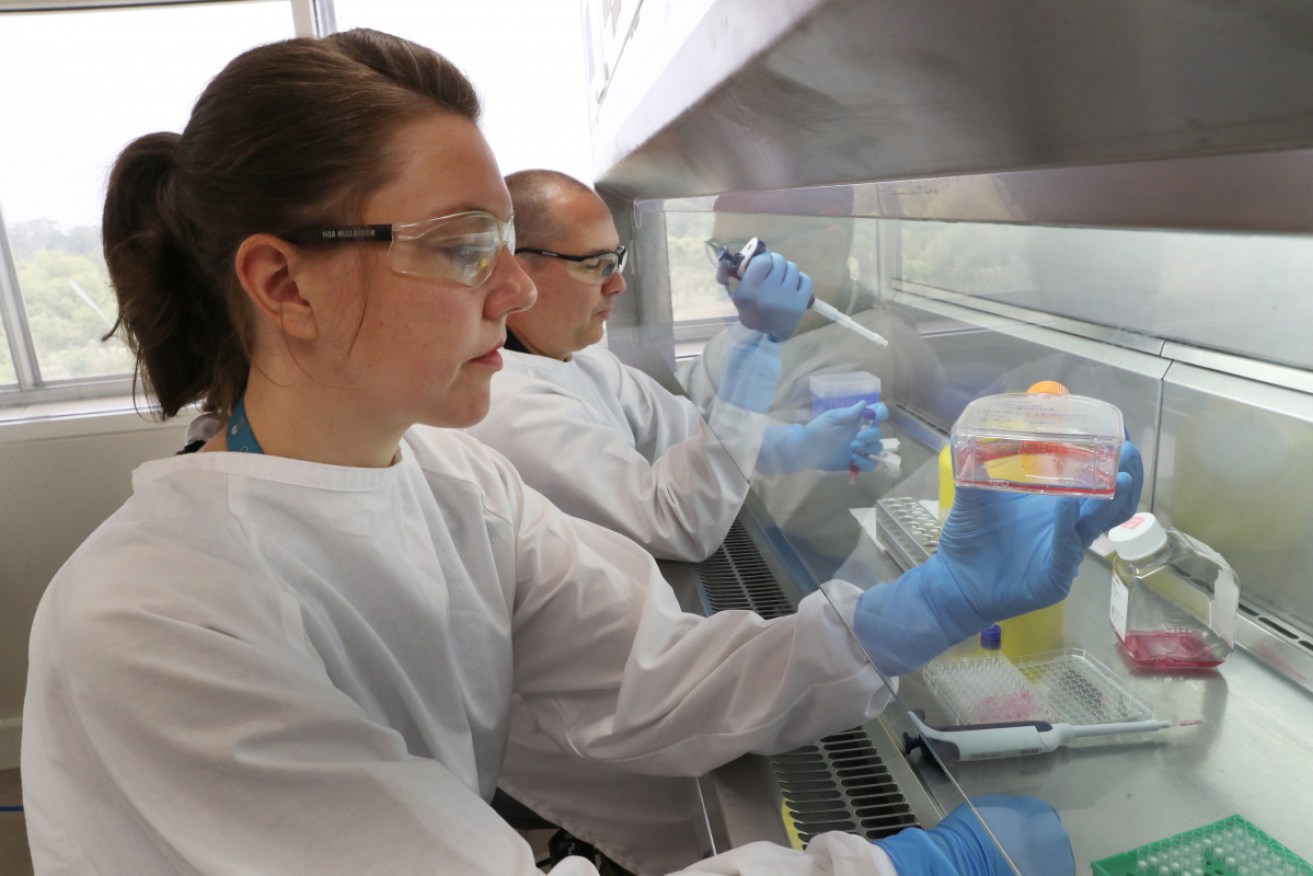CSIRO tests two potential COVID-19 vaccines in global race for a cure


Scientists at the CSIRO's high-containment facility in Geelong undertake key research in the race for a coronavirus vaccine. Photo: AAP
Fast-tracked testing of two potential vaccines is underway at Australia’s CSIRO in a critical milestone in the race to bring an end to the COVID-19 pandemic.
Australia’s national science agency is at the forefront of global vaccine testing, launching stage one trials on British and US prototypes – a major breakthrough in the global fight against coronavirus.
It comes amid warnings that a vaccine is the only way to beat the coronavirus, which has now infected more than 911,000 people in 205 countries and is approaching the 1 million milestone.
CSIRO biosecurity director Dr Rob Grenfell said the pre-clinical trials at the high-containment biosecurity facility in Geelong were significant given the rush by staff to get ready.
“Usually it takes one to two years to do this and we have apparently done it in eight weeks, so that’s actually really good,” Dr Grenfell said.
“These types of studies are vital to give us the confidence to move into human studies.”
- Related: Face masks explained: Who does and doesn’t need one
- Related: Romance alive as states reverse social distancing ‘bonk ban’
The two vaccine candidates were developed in record time by the University of Oxford in Britain and Inovio Pharmaceuticals, a San Diego biotech company.
The phase one trials, which are expected to take three months, will use animal subjects to test whether the potential vaccines are safe and effective.
Australia’s COVID-19 cases have reached 4862 and the death toll rose to 21 on Wednesday as deputy chief medical officer Paul Kelly warned the virus would not be beaten without a vaccine.
Meanwhile, a new overseas study has uncovered the highly contagious nature of the coronavirus, finding 50 per cent of people who tested positive for it did not show symptoms.
The study from Iceland, which tested 5 per cent of its population of 360,000 people – including those who were not considered at risk – found 1 per cent of those tested had the virus and half of them were asymptomatic or had very mild symptoms.
The discovery highlights the role of seemingly healthy people in spreading COVID-19 and the difficulty in containing a silent spreading illness.
Vaccine trials
There are about 35 vaccines in various stages of development around the world, with best estimates that it could take 18 months for a cure to become available.
The two prototype drugs are the first of many the CSIRO hopes to test and were identified for trials by the Coalition for Epidemic Preparedness Innovations, in consultation with the World Health Organisation.
Dr Grenfell understands that one of the vaccine candidates is also being tested overseas. If it is shown to be safe and effective in both trials, there would be a rapid conversion into human trials.
Professor Trevor Drew, who leads CSIRO’s coronavirus and vaccine work, said they had been studying SARS CoV-2, which causes COVID-19, since January.
“We are carefully balancing operating at speed with the critical need for safety in response to this global public health emergency,” Professor Drew said.
Dr Grenfell said he was optimistic about the fight against COVID-19 but repeated that a vaccine was up to 18 months away.
“The scientific ingenuity that we’re using, the global collaboration and co-operation is astounding,” he said.
“We’ve seen some momentous science across many avenues of the vaccine development pathway globally, so yes, I’m optimistic.
“At the moment, the best thing that we can all do is to maintain our social distancing and self-quarantining to minimise the spread whilst we’re waiting for effective drugs and vaccines.”
-with AAP








